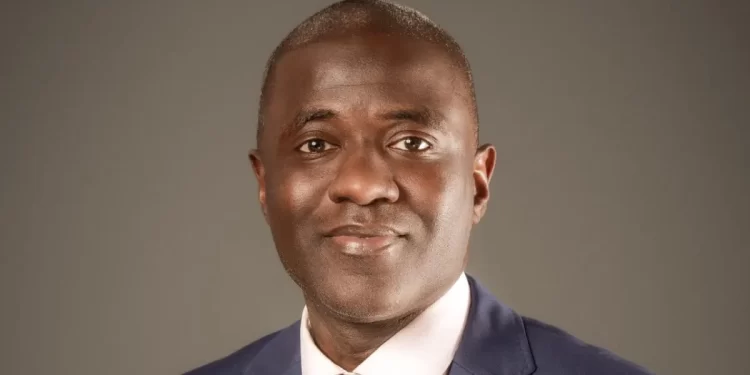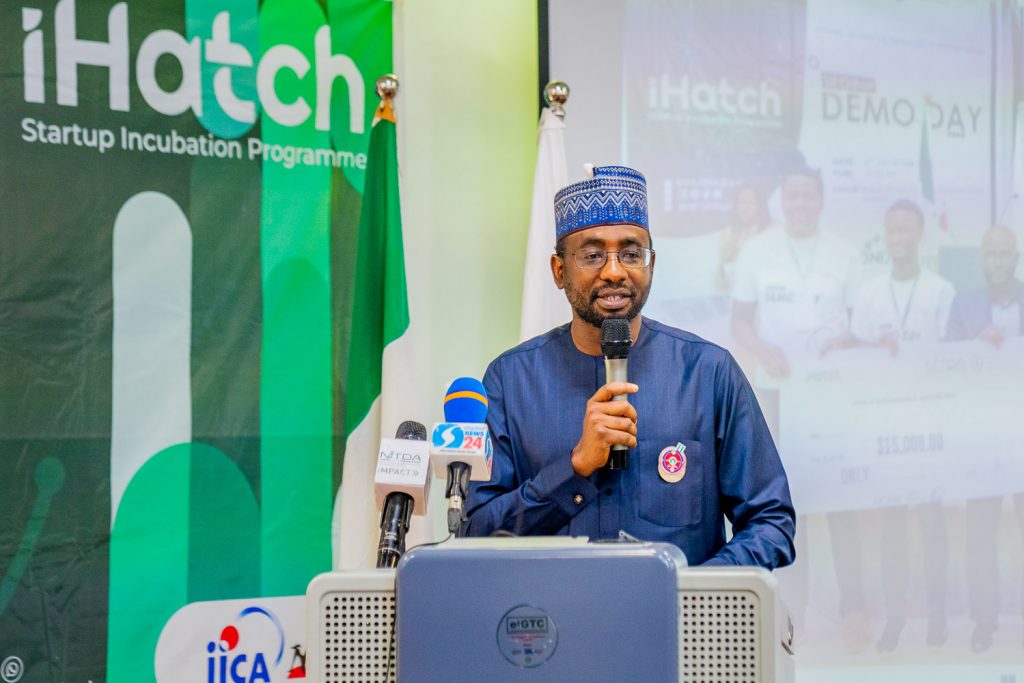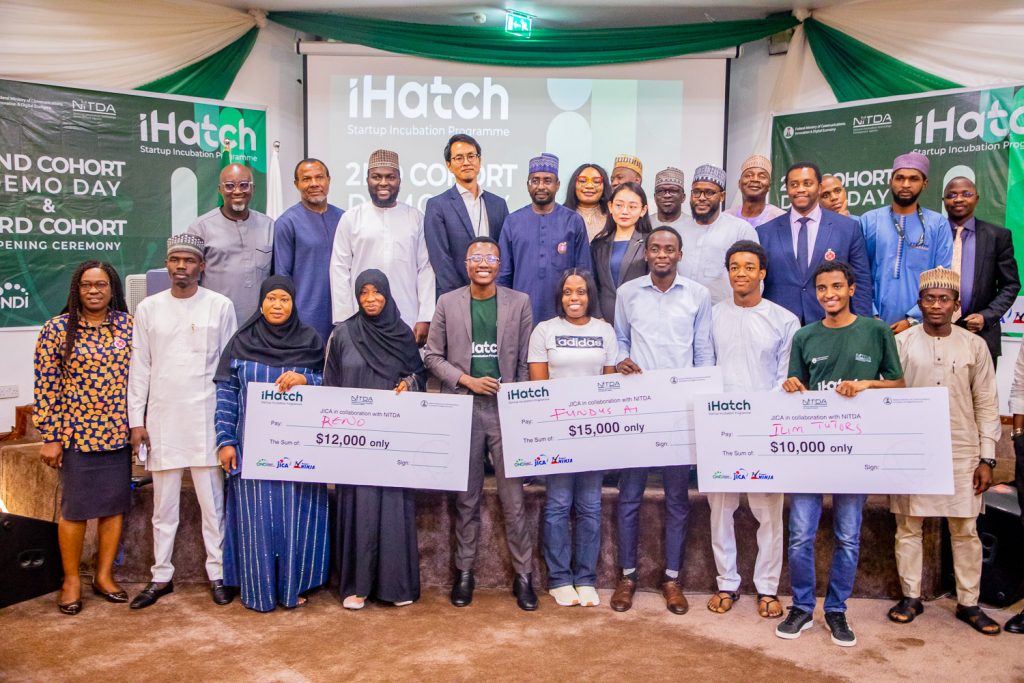Opinion
NCC: Making regulatory effort towards curbing financial crimes
Published
6 months agoon
With the increasing adoption of digital technologies and the emergence of new technologies, the scope of financial crimes has broadened and created further concerns. NCC is making an effort within it’s regulatory framework to curb the menace.
Robust information and communication technology (ICT) systems are critical for preventing and investigating financial crimes or mitigating the risks associated with virtual assets in financial markets.
These systems facilitate compliance with established standards or regulations, they also provide a platform that allows the monitoring, tracing, and analyzing of digital transactions in real-time.
iCT systems support secure data storage and encryption technologies, which are critical for safeguarding sensitive financial data.The emergence of digital banking has led to the proliferation of financial crimes especially in terms of e-fraud.According to the Executive Vice Chairman/Chief Executive Officer of the Nigerian Communications Commission (NCC), Dr. Aminu Maida, financial crimes refer to criminal activities that involve transactions, abuse, misuse, deception, or manipulation of financial systems for personal gain.He added that they include a wide range of offenses such as Insider abuse, Money Laundering, Terrorism Financing, Proliferation Financing, embezzlement, Fraud (e-fraud, Banking, securities, corporate, Intellectual Property), etc.
“These crimes do not only have a huge economic and social impact but can also be linked to violent crimes that lead to loss of lives. These crimes threaten the integrity, trustworthiness, stability, security, safety, and future of an entity (Country, enterprise, individual),” he stated.Role of ICTMaida said robust information and communication technology (ICT) systems are critical for preventing/investigating financial crimes or mitigating the risks associated with virtual assets in financial markets.
“These systems facilitate compliance with established standards or regulations, they also provide a platform that allows the monitoring, tracing, and analyzing of digital transactions in real time. ICT systems support secure data storage and encryption technologies, which are critical for safeguarding sensitive financial data.“Technological advancements have significantly aided crime prevention and law enforcement agency performance.
Large datasets have been analyzed using advanced data analytics, artificial intelligence, and machine learning algorithms to look for trends that indicate criminal activity. Based on historical data and real-time intelligence, predictive police programs have arisen to foresee and prevent crimes. Digital forensics techniques have also proven useful in criminal investigations.“Historically, a variety of legacy technologies have been used to combat crime; however, in more recent times, novel computer software and hardware are being utilized to monitor individual transactions and communications for suspicious activity.
For instance, anti-money laundering (AML) software uses algorithms to detect anomalous patterns in financial transactions that could suggest money laundering or other illegal activity. Law enforcement agencies are increasingly employing communication monitoring software to follow and analyze digital communications, such as emails, social media interactions, and instant messaging, to discover potential threats or illegal behaviour.
These technologies improve the ability to detect and prevent illegal digital activity.”Maida noted that Nigeria’s telecoms sector has grown significantly, resulting in massive amounts of data being generated daily.According to him, the advent of advanced data analytics and artificial intelligence (AI) provides a gateway to identify suspicious digital patterns indicative of crime.PartnershipThrough partnerships with financial institutions data can be filtered to identify these suspicious patterns and nip them in the bud.
These technologies provide real-time transaction monitoring, allowing for a proactive approach to crime prevention.It has been said that there must be a solid collaboration among the stakeholders and the experts on the deployment of sophisticated technologies to combat financial crimes.
Banks and tech companies are urged to work together to devise new strategies to be ahead of the criminals as the country loses a huge amount of money to such crimes.Specific tech applicationsTo combat financial crimes, innovative solutions such as blockchain, instant payments, artificial intelligence, machine learning, data analytics, regulatory technology solutions, and automated procedures are being deployed.The use of technological tools has made it significantly easier to deal with financial crime while building a long-term strategy for combating it.ToolsComputer Security Incident Response Team (CSIRT) is a group of experts, (of which the Nigerian Communications Commission (NCC) is part) that handles security incidents that can affect the operations of organisations. Digital forensics is a branch of forensic science that focuses on identifying, acquiring, processing, analysing, and reporting data stored electronically.
Electronic evidence is related to criminal activities and can be admitted in the process of prosecuting offenders in law courts.Verification of Biometrics: The incorporation of biometric authentication into financial transactions represents a big step forward in fraud prevention.
The NCC makes certain that telecom carriers follow strict biometric registration rules, which improves the accuracy and security of customer data and in turn financial transactions.Palantir Technologies Solution: Law enforcement agencies and financial institutions have used Palantir’s data analytics platform to examine massive volumes of data for patterns indicative of financial crimes.
It permits the integration of many data sources, allowing for more thorough investigations.Chainalysis Solution Case Study: Chainalysis specializes in blockchain analysis and provides tools for tracking cryptocurrency transactions.
This platform supports law enforcement in tracing illicit blockchain activity such as money laundering, ransomware payments, and illegal transactions.Data securityConcerning the significance of data security and privacy in the use of ICT for crime prevention, Maida said strong encryption and access controls ensure the security of critical information.He stated: “Strict respect for data privacy standards, such as the GDPR (General Data Privacy Regulation) in the European Union and the (NDPA) Nigerian Data Protection Act, aids in the preservation of trust in the use of ICT solutions for crime prevention.
”He listed potential concerns linked with the use of Information and Communication Technology to combat financial crime including cybersecurity threats, noting that as ICT systems get more complex, so do cybercriminal activities. Criminal actors take advantage of the inherent and emerging flaws identified in the ICT systems exploiting these flaws and causing harm.He said relying too much on automated systems for crime detection might result in false positives, in which innocent people or transactions are identified as suspects.
Based on the data on which they are taught, Maida said algorithms may exhibit biases, potentially leading to biased conclusions.Speaking on the human capacity issue, he said compliance officers continuously need to be kept abreast of emerging technologies and innovations and develop the requisite competencies required to use these solutions.On regulatory compliance, the EVC said navigating the complicated world of data protection and privacy rules as well as financial regulation compliance, can be difficult, adding that it is critical to ensure that ICT solutions adhere to legal regulations.
As technology advances, he said ICT solutions must be constantly updated and adapted to tackle evolving financial crimes while being concerned about funding issues.
Due to the evolving nature of technologies, he noted that investing in ICT solutions can become a challenge especially where there is a paucity of funds, stating that adequate funding is required to ensure that the latest solutions are deployed, up to date, and remain relevant.Other issuesMeanwhile, the NCC boss noted that while ICT has transformed the fight against financial crime, there are still difficulties that must be addressed collaboratively.
Some of the aspects according to him are inclusion and the digital divide.He confirmed that access to ICT services is not equal for all parts of the population.
The NCC is actively working to close the digital gap by pushing projects aimed at providing inexpensive and accessible ICT services to underprivileged communities.
This inclusion is critical in ensuring that all citizens have the tools they need to conduct financial transactions safely.
He said collaboration among multiple regulatory authorities is critical for developing a united approach to addressing financial crime.
The NCC actively collaborates with other regulatory authorities to share best practices, thereby guaranteeing a coordinated effort to protect Nigeria’s financial sector.“Continuous Improvement and Adaptation:Criminals adapt quickly to new technologies and strategies. To keep ahead of developing dangers, the NCC understands the importance of ongoing innovation in ICT solutions.
The Commission invests hugely in both Research and Development and in training its manpower on emerging innovations in the tech space.
The NCC is also cultivating beneficial relationships with technology companies in this regard.”Collaboration and International CooperationFinancial Crimes often occur across territorial borders. Criminals take advantage of loopholes in rules and enforcement systems across jurisdictions.
Collaboration between countries is thus critical for tracking down and apprehending these criminals. Some strategies for international collaboration and cooperation according to the NCC boss include sharing intelligence and expertise.
He explained that each country has its own set of insights, intelligence, data, and skills when it comes to tackling various types of financial crime.“By pooling these resources, we can gain a better grasp of emerging criminal techniques and methods.”He also suggested leveraging resources, saying: “Combating financial crimes requires enormous financial, technological, and human resources. Collaboration allows for the sharing of resources, making participating nations reduce the burdens of the huge associated cost while maintaining effective and efficient results.”Furthermore, Maida encouraged international conferences and gatherings where important players gather to debate and share best practices in preventing financial crime are crucial as well.
According to him, the purpose of these fora is to provide a platform for worldwide law enforcement agencies, cybersecurity specialists, and financial institutions to discuss insights and tactics for countering cyber-enabled financial crimes.
Last lineICT, if well utilised, plays a critical role in combating financial crimes by enabling real-time surveillance, regulatory compliance, and secure data processing. It provides advanced analytics, AI, and machine learning to law enforcement organisations for better crime detection. Furthermore, hard technologies such as CCTV cameras and security systems supplement physical security measures.
Continued investment in ICT solutions, as well as a multidisciplinary and multi-stakeholder strategy, combining technology specialists, legal professionals, and legislators, are critical in keeping up with emerging criminal methods. Public education and understanding of internet safety are also important in limiting the risks linked with the spread of criminality via technology.
You may like
Opinion
NiMet’s Renewed Collaboration With Agriculture Ministry Is Good For The Nigerian Economy
Published
1 week agoon
May 6, 2024NiMet’s Renewed Collaboration With Agriculture Ministry Is Good For The Nigerian Economy
By Dr. Uche Nworah
The Federal Ministry of Agriculture and Food Security is a Ministry of the Federal Government of Nigeria that has the mandate to ensure food security in crop, livestock and fisheries.
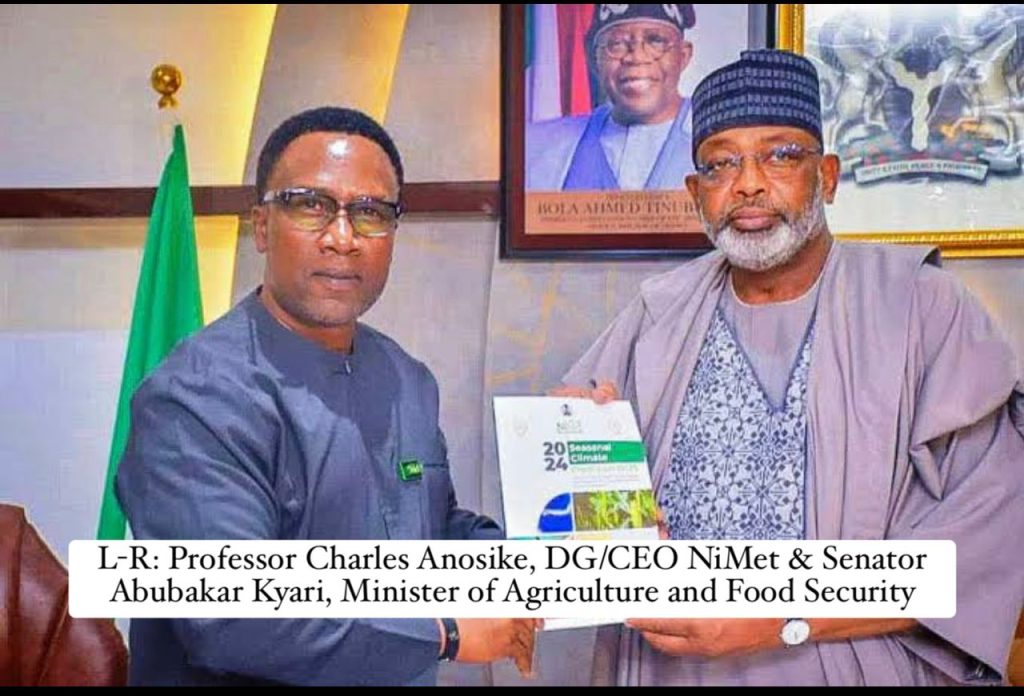
The ministry is also tasked to stimulate agricultural employment and services, promote the production and supply of raw materials to Agro- allied industries, provide markets for the products of the industrial sector, generate foreign exchange and aid rural socio-economic development throughout Nigeria.
The Nigerian Meteorological Agency (NiMet), is a Federal Government of Nigeria agency charged with the responsibility to advise the Federal Government on all aspects of meteorology. NiMet is also tasked to project, prepare and interpret government policy in the field of meteorology; and to issue weather (and climate) forecasts for the safe operations of aircrafts, ocean going vessels and oil rigs.
The Nigerian Meteorological Agency (NiMet), and the Federal Ministry of Agriculture and Food Security have in the past made moves to strengthen their existing relationship towards improving agricultural production and food security in Nigeria. The Ministry and NiMet had signed an MoU on the 3rd of March, 2022, to collaborate in a lot of areas including development of a dash-board for early warning systems, capacity building for staff of the Ministry and other stakeholders on accessing and interpreting information on meteorological parameter changes, and the provision of agro-meteorological advisory services to farmers on specific agricultural commodities. It would seem as if things quietened down after the MoU was signed.
However, at a joint press briefing on NiMet’s 2024 Seasonal Climate Prediction (SCP), at the instance of the Honourable Minister of Agriculture and Food Security, Senator Abubakar Kyari, on Tuesday, 16th April, 2024, the Honourable Minister and the Director General, Chief Executive Officer of NiMet, and Nigeria’s permanent representative with World Meteorological Organization (WMO), Professor Charles Anosike, resolved to strengthen the relationship and make it stronger. The Honourable Minister said at the press briefing; “Your presence here today, at our headquarters, marks another milestone in the deliberate and desirable collaboration and co-operation between our Ministry and your agency. Over the years, critical sectors of the economy, such as aviation, maritime, and agriculture, have come to rely on the Seasonal Climate Prediction published by NiMeT usually in the first quarter of the year. The reliability of the Seasonal Climate Prediction is indicated by increased recourse to the weather advisories contained therein”.
The Honourable Minister also said that NIMET’s Seasonal Climate Prediction can assist in shaping agriculture in Nigeria with regard to information about the pattern and duration of rainfall across the country’s agronomic zones, when to grow and length of growing season, as well as dry spells that could occasion loss of agricultural investment, where remedial measures are not taken. This in turn helps to boost the adaptive capacity of farmers. Regrettably, there have been farming seasons in Nigeria when farmers did not take advantage of the institutional advice from NIMET, and on their own misread the rainfall pattern, only to face dry spells that invariably ruined their crops and livelihoods.
In his remarks, Professor Anosike thanked the Honourable Minister for his leadership and the kind gesture to strengthen the relationship between NiMet and the ministry. “NiMet wishes to build on the database of farmers that the ministry has. Already NiMet disseminates information about seasonal climate prediction through formal engagements with farmers , and through the media such as the BBC, social media, Radio Nigeria and through national television stations.
However, a lot of gaps still exist within the dissemination space. Our goal is to reach as many Nigerians as possible with timely, accurate and actionable weather and climate information as part of NiMet Early Warning Drive”
Continuing, Professor Anosike said; “Food security requires consistent collaboration with all stakeholders. The SCP as predicted are being manifested but the challenge remains disseminating the contents to over 70 million farmers in Nigeria. Farmers need to be equipped with information and other resources to make climate resilient decisions”.
It is noteworthy and encouraging that weeks after the joint press briefing between the Federal Ministry of Agriculture and Food Security and NiMet, there are evidences of the renewed collaboration. This is positive and will benefit the Nigerian economy. Knowledge is power and if Nigerian farmers have weather and climate information translated in their local languages, they will be able to make climate resilient decisions such as knowing when to plant, what species of plants and seeds to plant and when to harvest to achieve greater yield.
The 2024 Seasonal Climate Prediction (SCP) released by NiMet provides an outlook of climate variables to help improve decision-making across all sectors of the economy. NiMet’s SCP for 2024 which was originally released in February 2024, forecasts normal on-set of rains over the northern states.Borno, Abia and Akwa Ibom states are predicted to have early on- sets. An early end to the season is predicted for parts of Yobe, Jigawa, Sokoto, Kebbi, Kano, Kaduna, Plateau, Nasarawa, Taraba, Gombe, Bauchi, Cross River, Ebonyi, Ogun and Lagos states.
A late secession is predicted over the southern states of Bayelsa, Rivers, Akwa Ibom, Ondo, Ekiti and part of Edo, Delta, Ogun, Oyo, Kogi, Kwara, FCT, Niger and Kaduna states.
Day and Night time temperatures for January to May is predicted to be warmer than normal in most parts of the country. Also, most of the North is anticipated to be cooler in March.
The Ministry and NiMet have re-intensified efforts at disseminating NiMet’s seasonal climate prediction (SCP), using FRCN network service, local radio, local and national press, national and local television. They are also using social media platforms. Applying the multi-step information flow model will require social media savvy stakeholders picking up the information online and sharing same to the farmers in their various communities.
A critical aspect of the dissemination is the physical downscaling of the SCP information to farmers in the various communities. This will require the support of the various states ministries of agriculture and NGOs operating in the agricultural space. They should support current downscaling efforts by the ministry and NiMet. From the schedule released by the Federal Ministry of Agriculture and Food Security, and NiMet, downscaling of SCP information to farmers in the six geopolitical zones have been scheduled as follows; Ondo (13th May), Imo (15th May), Delta (17th May), Niger (22nd May), Sokoto (4th June) and Borno (6th June). Farmers, civil society organizations, states ministries of agriculture, the media and other stakeholders can help in sensitizing the farmers to attend on the dates stated for their zones.
This initiative by the two MDAs is viewed as a positive step towards enhancing food security in Nigeria. It will empower our farmers, and has the capacity to mitigate the perennial challenges of climate variability. It will at the same time contribute towards sustainable resilience in the agricultural value chain.
The full SCP report can be downloaded from www.nimet.gov.ng. The report is also available from the Federal Ministry of Agriculture And Food Security Abuja, and State Ministries of Agriculture.
Dr. Nworah, a public affairs commentator wrote from Lagos.
Opinion
America, Iran and the abuse of democracy, human rights, by Hassan Gimba
Published
1 week agoon
May 6, 2024America, Iran and the abuse of democracy, human rights, by Hassan Gimba
“One of the shrewdest ways for human predators to conquer their stronger victims is to convince them steadily with propaganda that they are still free.” N. A. Scott, American author.
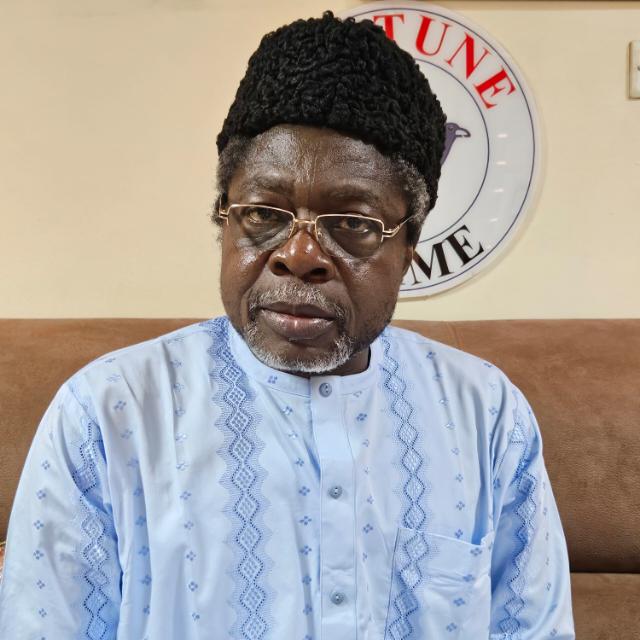
Every human being currently living on earth came to this world and saw the United States of America posing as the cradle of democracy, a bastion of freedom and a citadel of human rights.
For those of us in Africa, especially West Africa, and particularly those along the coastline, that America ruptured family cohesion, ties and lineage by forcefully taking our able-bodied forefathers and enslaving them, was either forgotten, forgiven, or both.
That after it was forced to abolish slavery by a changing world, it found a way to continue enslaving our able-bodied and intelligent youths in the name of providing greener pastures for them, which was either overlooked, not realised, or both.
As time went on, that it labelled those who wanted the best for their people as communists and demonised them, creating a bipolar world was either accepted as gospel truth by those who did not know the truth or parroted by those who were recruited to do that, or both.
That the then Eastern bloc (or communist/socialist countries), under the guidance of the Union of Soviet Socialist Republics (USSR), and its star boy, Fidel Castro of Cuba, all lined up to fight apartheid for African freedom was either lost on us or remained unappreciated, or both.
That Fidel Castro’s Cuba fought enslavers out of Angola for Angolans to taste freedom, training African youths in its universities and supplying Africa with medical doctors and free drugs while we still preferred to rush to America where we paid for everything through the nose reflected our slave mentality or lack of capacity to embrace truth, or both.
Truth is, we all grew up looking up to Uncle Sam as someone who cared for us in the third world, even when it was propping up the apartheid regime in South Africa or being a pillar of support to Ian Smith in Rhodesia, now Zimbabwe (Southern Rhodesia) and Zambia (Northern Rhodesia). Many of us did not see anything wrong in its support for Joshua Nkomo against the pan-Africanist Robert Mugabe.
For a long time, America has been working on the psyche of youths, especially in Africa, the Middle East, Asia and the communist/socialist countries to make them see their society as primitive and America as modern. The youths see their cultures and traditions as backward and archaic, their religion as stories of old, and Western depravity as the new religion.
It found a way in 1989 to infiltrate and brainwash Chinese students to rise against their country, demanding “political and economic reforms and greater respect for human rights”. The protesters gathered in Tiananmen Square in central Beijing, where they were forcefully evicted by military units, who killed a lot of them.
Tiananmen Square, or Tian’anmen Square, is a city square, measuring 765 x 282 metres, in the city centre of Beijing, meaning “Gate of Heavenly Peace”. The square contains the Monument to the People’s Heroes, the Great Hall of the People, the National Museum of China, and the Mausoleum of Mao Zedong, who proclaimed the founding of the People’s Republic of China in the square on October 1, 1949. It has great cultural significance in Chinese history.
America and its Western allies and propaganda machines did not allow what happened in China to be swept under the carpet or forgotten easily. It kept hammering on China’s “evil of repression”, that it emasculated and silenced the voice of the voiceless because that’s what students are. It told the world that China was an enemy of freedom, free speech, free association and democracy which it proclaimed as the only acceptable world order, despite its dalliance with repressive, autocratic and monarchic regimes, around the world.
Now fast-forward to 2024 and the pinching shoe is in America’s feet. Its students in no fewer than 15 universities and counting, with Columbia University in the lead, are protesting with the battle cry “Free, Free Palestine” for the freedom of Palestine that has been under Israel’s subjugation for decades.
America, the self-acclaimed doyen of freedom of association and speech, the guardian angel of democracy, is cracking down on the students for freely associating and using free speech to seek the freedom of another country. So far, scores of them have been arrested, some suspended, and some dismissed outright, while lecturers have been threatened with sack if they showed any sort of support to the students’ cause.
But that will hardly deter academics used to free speech as a first nature. One professor in the university bravely declared: “This is about a genocide being carried on with American money and with American weapons, against a people enduring generations of occupation.”
In a cheeky, and poignant, role reversal, Iran, which had suffered American instigation of its youths over time and had to deal with as it deemed fit, called on the US not to jeopardise democracy, freedom of association and free speech.
Shiraz University, a globally ranked university in Iran, just announced that it will grant scholarships to the students of American and European universities who have been expelled for supporting Palestine. It is also going to hire professors who have been fired or threatened with sacking for their stance towards Palestine.
Before the breeze blew and we saw the anus of the fowl, this was what America was doing to others all over the world – instigating youths against their fatherland, and when the country attempted to rein in its citizens, they would cry foul. They will then dole out scholarships, grants or work and Green Cards to those who fought against their country and its system.
In the words of Samuel P. Huntington, an American political scientist and academic, “The West won the world not by the superiority of its ideas or values or religion…but rather by its superiority in applying organised violence. Westerners often forget this fact; non-Westerners never do.”
Now America is receiving a dose of its medicine and it has failed to behave better than those countries it accused of truncating democracy, free association, free speech and human rights abuses.
Truth, it is said, is the only one that lasts. Falsehood and hypocrisy are just as temporary as the time it will take to blindfold the people.
What America is showing the world today is exactly the echo of the time immemorial words of Abraham Lincoln, its 16th president, who issued the Emancipation Proclamation that declared slaves forever free: “You can fool some of the people for all of the time, and all of the people for some of the time, but you cannot fool all of the people for all of the time.”
Hassan Gimba is the Publisher and Editor-in-Chief of Neptune Prime.
Opinion
IHATCH: JAPAN GOVERNMENT TASK TO LEVERAGE NIGERIA’S YOUTHFUL POPULATION- DG NITDA
Published
5 months agoon
December 3, 2023
By James Ishaku
As part of the current administration of President Bola Tinubu’s commitment towards creating meaningful opportunities for Nigerian youths, the Director General Of the National Information Technology Development Agency (NITDA), Kashifu Inuwa CCIE has called on the government of Japan to leverage on the youthful population through strategic talent partnership that will nurture and build a workforce that can be exported.
The DG made the call at the Ihatch startup incubation programme 2nd cohort demo day and 3rd cohort opening ceremony organised by the subsidiary of the agency, Office for Nigerian Digital Innovation (ONDI), in partnership with Japan International Corporation Agency (JICA) in Abuja.
Inuwa noted that the ihatch 5-month free intensive incubation programme executed by the ONDI and hosted within the National Centre for Artificial Intelligence and Robotics (NCAIR) is designed to help Nigerian tech entrepreneurs refine their business ideas through a series of coaching, lectures, and booth camps to develop scalable and adaptable business models that willfocus on youth, innovation, entrepreneurship, and technology.
He added that the incubation programme will be held simultaneously in Abuja, Lagos, Port Harcourt, Gombe, and Kano and JICA has agreed to extend the Fourth Cohort across each of the 36 States and the FCT. This is to enable wider reach and to stimulate the startup ecosystems across the States.
The DG stated that not fewer than 1,218 applications were received for the Second Cohort and the number was pruned down to 8 startups, comprising 16 persons, a Founder and Co-Founder for each startup, after undergoing levels of rigorous selection process conducted by a panel of judges, comprising experts in diverse areas of technology and innovative entrepreneurship.
He explained that the selection process assessed the startups’ ideas based on the criteria of profitability, scalability, social impact, idea technique, competitive advantage, experience, and a clearly defined future roadmap.
Inuwa further revealed that a total of 11,183 applications were received from across the 6 geopolitical zones for the Third Cohort. This culminated in the selection of the top 8 startups, comprising 16 founders in total that will participate in the Third Cohort that was launched.
He added that 16 startups that participated in the first and second cohorts of the iHatch incubation programme have moved on to achieve remarkable success in the areas of job creation, funding, participation in events, and valuable partnerships which have created a combined total of 179 direct jobs in the span of agriculture, health, education, and e-commerce sectors.
The DG further asserted that apart from the total grant of US$45,000 (US$15,000 each) for Proof of Concept (POC) to the top 3 startups in the first cohort, some of the startups have raised some funding through other sources. Xolani Health (a health tech startup from the first cohort) secured a grant worth US$155,000, BetaLife (a health tech startup from the first cohort) secured an angel investment of US$60,000, Gifty (an e-commerce startup from the second cohort) got a grant of USD$8,000 while two other startups from the first and second cohorts respectively, raised a combined total grant of US$6,000.
Inuwa affirmed the agency’s commitment to working with relevant stakeholders and partners towards the successful implementation of the Nigeria Startup Act (NSA) which will accelerate innovation and provide much-needed jobs for our teeming youths. Leaving nothing to chance in our resolve to nurture the entrepreneurial spirit in our youth to catalyze the Nigerian digital economy to the next level.
The Honourable Minister, Federal Ministry of Industry, Trade and Investment, Doris Nkiruka Uzoka-Anite, represented by National Coordinator, National Talent Export Programme, Dr Femi Adeluyi, applauded NITDA for the various initiatives and programs put in place for the advancement of the tech ecosystem in the country.
Anite noted that the NITDA DG at the Digital Nigeria International Conference 2023 edition harped on the need for Nigeria to become the talent destination of the world where countries will come to seek a workforce that will work with them towards achieving their goals and objectives.
She added that “technology is a pivotal tool in all aspects of life which cannot be overemphasized and the green transition scoreboard global total has reached about $7.13 trillion for export and about $6.6 trillion for importation, the important aspect is that 54% of these activities is digitally edible and prepares people to be effective and efficient in the different sector of the economy is laudable”.
The Minister also appreciated JICA for its relentless efforts toward the advancement of the tech ecosystem in the area of automobile, development, training, scholarships, interventions and a lot more which has impacted the citizens directly or indirectly.
The Ambassador of Japan to Nigeria, Matsunaga Kazuyoshi, represented by Yuzurio Susumu Chief of Nigeria Office in his remarks stated that Nigeria is the most popular country in Africa and the heart hub of entrepreneurship activities aimed towards the advancement of the country.
He added, “With all the challenges faced by insecurity, and limited infrastructures in the country, Nigerian startups are demonstrating remarkable creativity and resilience in developing solutions that other critical social issues in areas such as education, transportation, healthcare and finance”.
He added that the present administration has identified the transformation potential of startups and digitization making it a key factor in diversifying the Nigerian economy from its dependence on oil.
The Ambassador pointed out that startups are seen as a catalyst for business transformation, bringing fresh ideas, innovative technologies and new employment opportunities. Japan has the longest history of technological innovation and entrepreneurship has a significant role in supporting the Nigerian system.
Among those who attended were representatives from both the private and public and the top three (3) startups emerged with cash prices to Fundus AI 1st postion $15,000.00, Reno 2nd postion with $12,000.00 and Ilim Tutors 3rd postion $10,000.00 respectively.
Trending
-

 News5 years ago
News5 years agoBreaking: ‘Penalty’ Crooner Small Doctor Caught in Possession of Fire Arms
-

 News5 years ago
News5 years agoTiffany Trump Is Dating a Millionaire Michael Boulos From Nigeria
-

 News5 years ago
News5 years agoPDP Set To Cause Panic Days To Polls: FG
-

 News5 years ago
News5 years agoINEC Engages EFCC, FIU In Tracking Campaign Funding
-
News2 years ago
INEC Publish Final List of Candidates For 2022 Osun Governorship Poll
-

 Politics5 years ago
Politics5 years agoPDP Alleges Plot by APC, Presidency to Detain Its Leaders
-

 Politics5 years ago
Politics5 years agoOsinbajo Has Betrayed Yorubas, Says Afenifere
-

 Politics5 years ago
Politics5 years agoLagos Commissioner Decamps To PDP





